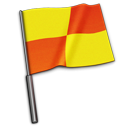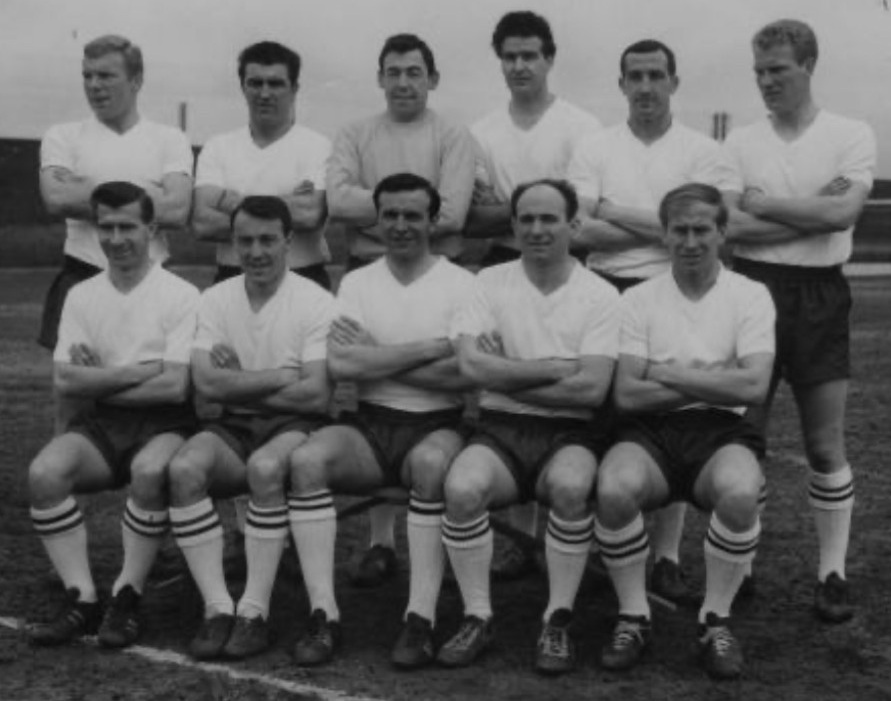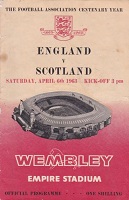|
|
|
Match
Summary |
|
|
  Officials
from Netherlands Officials
from Netherlands |
England |
Type |
Scotland |
Referee
(-) - Leopold
Sylvain Horn
x (-).
Linesmen -
Mr Van Ravens (flame flag) and
Mr Van Der Veer (orange flag)
Teams presented to The Guest of Honour, The Rt. Hon Earl of Derby, MC.
|
|
Goal Attempts |
|
|
|
Attempts on Target |
|
|
|
Hit Bar/Post |
|
|
|
Corner Kicks Won |
|
|
|
Offside Calls Against |
|
|
|
Fouls Conceded |
|
|
|
Possession |
|
|
|
flg.jpg) England
Team England
Team |
| |
|
Rank: |
No official ranking system established;
ELO rating
10th to 11th |
Colours: |
The 1959 Bukta
home uniform -
White v-necked short-sleeved continental jerseys, blue shorts,
white socks with red/white/blue tops. |
|
Capt: |
Jimmy Armfield, sixth captaincy |
Manager: |
Alfred
Ernest Ramsey, 43 (22 January 1920), appointed
25 October 1962, effective 31 December 1962, as part of the ISC.
second match, W 0 - D 0 - L 2 - F 3 - A 7.
Team chosen by Selection Committee on Wednesday, 27 March 1963. |
flg.jpg) England
Lineup England
Lineup |
|
81 |
|
Banks, Gordon |
25 |
30 December 1937 |
G |
Leicester City FC |
1 |
2ᵍᵃ |
|
816 |
|
2 |
Armfield, James |
27 |
21 September 1935 |
RB |
Blackpool FC |
34 |
0 |
|
817 |
3 |
Byrne, Gerald |
24 |
29 August 1938 |
LB |
Liverpool FC |
1 |
0 |
|
4 |
Moore, Robert F.C. |
21 |
12 April 1941 |
RHB |
West Ham United FC |
10 |
0 |
|
5 |
Norman, Maurice |
28 |
8 May 1934 |
CHB |
Tottenham Hotspur FC |
7 |
0 |
|
6 |
Flowers, Ronald |
28 |
28 July 1934 |
LHB |
Wolverhampton
Wanderers FC |
41 |
10 |
7 |
Douglas, Bryan |
28 |
27 May 1934 |
OR |
Blackburn Rovers FC |
34 |
9 |
|
8 |
Greaves, James |
23 |
20 February 1940 |
IR |
Tottenham Hotspur FC |
27 |
22 |
|
9 |
Smith, Robert A., inj. for most of first half. |
30 |
22 February 1933 |
CF/OR |
Tottenham Hotspur FC |
9 |
9 |
|
818 |
10 |
Melia, James |
25 |
1 November 1937 |
IL |
Liverpool FC |
1 |
0 |
|
11 |
Charlton, Robert |
25 |
11 October 1937 |
OL |
Manchester United FC |
41 |
25 |
|
reserve: |
Gordon Milne (Liverpool FC) |
|
team notes: |
Manager Alf Ramsey played against Scotland in four matches from 1950
until 1953.
Bobby Smith collided with Eric Caldow after five minutes, he missed
the majority of the first half to receive treatment on his left knee,
but returned for the second half as outside-right. |
|
|
|
2-3-5 |
Banks -
Armfield, Byrne -
Moore, Norman, Flowers -
Douglas (Smith), Greaves, Smith, Melia, Charlton
notes: Smith spent the second half
as outside-right. |
|
Averages: |
Age |
- |
Appearances/Goals |
- |
- |
|
England teams v. Scotland: |
|
1962: |
Springett |
Armfield |
Wilson |
Anderson |
Swan |
Flowers |
Douglas |
Greaves |
Smith |
Haynes |
Charlton |
|
1963: |
Banks |
Armfield |
Byrne |
Moore |
Norman |
Flowers |
Douglas |
Greaves |
Smith |
Melia |
Charlton |
|
|
|
|
 Scotland
Team Scotland
Team |
| |
|
Rank: |
No official ranking system established;
ELO rating 8th |
Colours: |
Made by Umbro -
blue continental jerseys with white v-neck collars/cuffs, white shorts, blue socks
with red tops. |
|
Capt: |
Eric Caldow |
Manager:
Trainer: G. Harvey (Heart of Midlothian FC) |
John Miller
McColl, 35 (7 June 1927), appointed before November 1960.
14th match, W 10 - D 0 - L 4 - F 42 - 30.
Team chosen by Selection
Committee on Thursday, 28 March 1963. |
 Scotland
Lineup Scotland
Lineup |
|
|
Brown, William D.F. |
32 |
8 October 1930 |
G |
Tottenham Hotspur FC, England |
17 |
27ᵍᵃ |
|
2 |
Hamilton, Alexander W. |
24 |
31 January 1939 |
RB |
Dundee FC |
7 |
0 |
|
3 |
Caldow, Eric, injured off 5th min. |
28 |
14 May 1934 |
LB |
Rangers FC |
40 |
4 |
|
final app |
|
4 |
Mackay, David C. |
28 |
14 November 1934 |
RHB |
Tottenham Hotspur FC, England |
16 |
2 |
|
5 |
Ure, John Francombe |
23 |
7 December 1939 |
CHB |
Dundee FC |
5 |
0 |
6  |
Baxter, James C. |
23 |
29 September 1939 |
LHB |
Rangers FC |
13 |
3 |
|
7 |
Henderson, William |
19 |
24 January 1944 |
OR |
Rangers FC |
3 |
2 |
|
8 |
White, John A. |
25 |
28 April 1937 |
IR |
Tottenham Hotspur FC, England |
17 |
2 |
|
9 |
St. John, Ian |
24 |
7 June 1938 |
CF |
Liverpool FC, England |
16 |
6 |
|
10 |
Law, Denis |
23 |
24 February 1940 |
IL |
Manchester United FC, England |
17 |
10 |
|
11 |
Wilson, David |
24 |
10 January 1939 |
OL/LB |
Rangers FC |
13 |
3 |
|
reserve: |
Billy McNeill (The Celtic FC) |
|
team notes: |
Manager Ian McColl debuted for Scotland against England in April 1950,
also playing in the 1957 meeting, and earned his fourteenth and final
appearance angainst England in 1958.
Eric Caldow broke his leg in
the fifth minute following a collision with Bobby Smith. |
|
|
|
2-3-5 |
Brown -
Hamilton, Caldow (Wilson) -
Mackay, Ure, Baxter -
Henderson, White, St. John, Law, Wilson
notes: Davie Wilson played 85
minutes as the left-back, after Caldow was stretechered off. |
|
Averages: |
Age |
24.8 |
Appearances/Goals |
14.9 |
2.7 |
|
|
|
|
Match Report
by Mike Payne |
|
 This was Scotland's day as
at last they won a famous victory at Wembley, their first on English soil
since 1951. A full house paid record receipts (for any game in Britain) of
£76,000 for the privilege and the many Scots in the audience made the
afternoon their own with their vociferous support. Wembley, looking spick
and span with its new roof, braced itself for the invasion of the
marauding army. This was Scotland's day as
at last they won a famous victory at Wembley, their first on English soil
since 1951. A full house paid record receipts (for any game in Britain) of
£76,000 for the privilege and the many Scots in the audience made the
afternoon their own with their vociferous support. Wembley, looking spick
and span with its new roof, braced itself for the invasion of the
marauding army.
The match started tragically for Scotland.
After only five, a fierce collision between Bobby Smith and Caldow ended
with the Scottish captain being stretchered off to hospital with a
fractured leg. But far from giving England the edge, it seemed to inspire
the Scots to a very high level of skill and endeavour.
Wilson moved to left-back and the Scotland midfield of Baxter, White and
Mackay rolled up their sleeves and knuckled down to take a grip on the
game. England seemed bereft of ideas. Bobby Moore and Ron Flowers never
used the ball constructively and Jimmy Melia was too predictable in all
that he did. Up front Bobby Charlton flitted in and out of the game and
Jimmy Greaves had a day he would soon like to forget.
The first goal came after half an hour. Henderson put in a deep cross
which Jimmy Armfield collected and seemed to have under control.
Unfortunately for him, the England skipper tried to dribble the ball clear
of his own penalty area and was caught in possession by Baxter. The
elegant Scottish number-six strode forward and gave Gordon Banks no chance
with a crisp shot.
The goal was no more than Scotland deserved and was a fitting reward for
their enterprise and skill. Baxter was a revelation and had a dream match.
Memories of the Hungarian, Bozsik, came flooding back as Baxter's presence
dominated the play.
Within two minutes, Scotland were two up. Henderson, who gave Byrne a
torrid time throughout, darted through a gap but was brought down,
sandwich-style by Flowers and the bewildered Byrne. "Penalty"! screamed
the Scots.
The referee agreed and the super confident Baxter duly obliged from the
spot-kick. It was the first penalty he had ever taken , but on a day when
he could have practically walked on water there was never going to be any
other volunteer.
From then on it was a story of Scotland controlling what little England
could muster. There was one lively spell midway through the second half
when England could have come right back into things. Four times Greaves
found himself in excellent positions, only to head wide on each occasion.
In another attack, Greaves turned sharply and this time brought the best
out of his Spurs clubmate, Brown, in goal. With ten minutes to go, and
with Scotland understandably tiring, England finally pulled a goal back.
The visitors' centre-half, Ian Ure, a tower of strength at the heart of
their defence, made his only mistake when he missed a cross by Smith,
allowing Bryan Douglas the chance to shoot past Brown.
The last word went to Scotland though and Mackay made Banks' crossbar
shudder after a blistering free-kick. So Scotland deservedly held on and
the deafening roar of their supporters at the final whistle almost lifted
the new roof off the stand before it had time to settle!
It was a brave performance by Scotland but one consolation for the home
side was the splendid form shown by their new goalkeeper Gordon Banks. He
looked safe and sure and was full of confidence.
|
|
Match Report
by Norman Giller |
|
 Both
teams were down to ten men within five minutes following a collision between
Bobby Smith and Scottish skipper Eric Caldow, who was carried off with a
triple fracture of the leg. By the time Smith limped back on with his bruised
knee bandaged 'Slim' Jim Baxter had twice beaten England's new goalkeeper
Gordon Banks, first after a misplaced pass by Armfield and then from the
penalty spot. Bryan Douglas scored ten minutes from the end, but the Scots
deserved a victory that was masterminded by Baxter who memorably walked off
with the match ball tucked up inside his jersey. This stunningly skilled
showman had owned the pitch, so why not the ball? Liverpool team-mates Gerry
Byrne and Jimmy Melia made their debuts. It was the first match played at the
'new' Wembley with a £500,000 roof that ran right round the stadium like a
giant lip. A 98,000 crowd paid then record receipts of £76,000. Ramsey had
kicked off with two defeats. Could this be the man to lead England to the
World Cup? Both
teams were down to ten men within five minutes following a collision between
Bobby Smith and Scottish skipper Eric Caldow, who was carried off with a
triple fracture of the leg. By the time Smith limped back on with his bruised
knee bandaged 'Slim' Jim Baxter had twice beaten England's new goalkeeper
Gordon Banks, first after a misplaced pass by Armfield and then from the
penalty spot. Bryan Douglas scored ten minutes from the end, but the Scots
deserved a victory that was masterminded by Baxter who memorably walked off
with the match ball tucked up inside his jersey. This stunningly skilled
showman had owned the pitch, so why not the ball? Liverpool team-mates Gerry
Byrne and Jimmy Melia made their debuts. It was the first match played at the
'new' Wembley with a £500,000 roof that ran right round the stadium like a
giant lip. A 98,000 crowd paid then record receipts of £76,000. Ramsey had
kicked off with two defeats. Could this be the man to lead England to the
World Cup?
|
|
Match Report
by Glen Isherwood |
|
Scotland, the reigning British
Champions, had won every game in the competition since losing 9-3 on their
last visit. They had beaten England 2-0 at Hampden Park the previous year
but had to win to retain the Championship outright. Their last Wembley win
had been in 1951. They had decided not to enter the European Championship.
England also had to win to regain the title, a draw would mean it was
shared.
In the sixth minute Wembley's so-called injury hoodoo struck again as
Smith and Caldow were involved in a collision which saw both players
stretchered off. Caldow had a broken leg while Smith returned for the
second half. Just before the half hour Scotland took the lead. Armfield
lost the ball on the edge of the box to Jim
Baxter, who ran on and beat Banks with a rising shot. Two minutes later
Flowers brought down Henderson and Baxter sent Banks the wrong way from
the penalty spot. Even though Smith was not fully fit, England's extra man
began to tell in the second half and it was Smith's long ball, missed by
Ure, which left Bryan Douglas in the clear to drive a low shot into the
corner with 11 minutes left. Scotland held on, though, to retain the
British Championship in the new look stadium, now with cover for all
spectators.
Scotland completed their first ever hat-trick of victories over England in
the British Championship the following year with a 1-0 win at Hampden
Park.
|
In
Other News....
|
It was on 5 April 1963 that 24-year-old Scottish-born
Olympic skier, Sonja McCaskie was raped and strangled in her
home in Reno, Nevada by an 18-year-old high-school student,
Thomas Bean, who then dismembered her body. He was tracked
down by police after pawning a camera stolen from her house.
Bean gave a full confession and he was sentenced to death by
gas chamber, but following seven years on 'death row',
Nevada abolished the death penalty for crimes committed
under the age of 21, and he died in prison at eighty.
McCaskie was in the process of applying to join the British
team for her second Winter Olympics, in 1964 in Innsbruck. |
|
|
 Source Notes Source Notes |
TheFA.com
LondonHearts.com
Original newspaper reports
Rothman's Yearbooks
Mike Payne's England: The Complete Post-War Record
(Breedon Books Publishing Company, Derby, U.K., 1993)
Norman Giller, Football Author
____________________
CG
|


 Both
teams were down to ten men within five minutes following a collision between
Bobby Smith and Scottish skipper Eric Caldow, who was carried off with a
triple fracture of the leg. By the time Smith limped back on with his bruised
knee bandaged 'Slim' Jim Baxter had twice beaten England's new goalkeeper
Gordon Banks, first after a misplaced pass by Armfield and then from the
penalty spot. Bryan Douglas scored ten minutes from the end, but the Scots
deserved a victory that was masterminded by Baxter who memorably walked off
with the match ball tucked up inside his jersey. This stunningly skilled
showman had owned the pitch, so why not the ball? Liverpool team-mates Gerry
Byrne and Jimmy Melia made their debuts. It was the first match played at the
Both
teams were down to ten men within five minutes following a collision between
Bobby Smith and Scottish skipper Eric Caldow, who was carried off with a
triple fracture of the leg. By the time Smith limped back on with his bruised
knee bandaged 'Slim' Jim Baxter had twice beaten England's new goalkeeper
Gordon Banks, first after a misplaced pass by Armfield and then from the
penalty spot. Bryan Douglas scored ten minutes from the end, but the Scots
deserved a victory that was masterminded by Baxter who memorably walked off
with the match ball tucked up inside his jersey. This stunningly skilled
showman had owned the pitch, so why not the ball? Liverpool team-mates Gerry
Byrne and Jimmy Melia made their debuts. It was the first match played at the